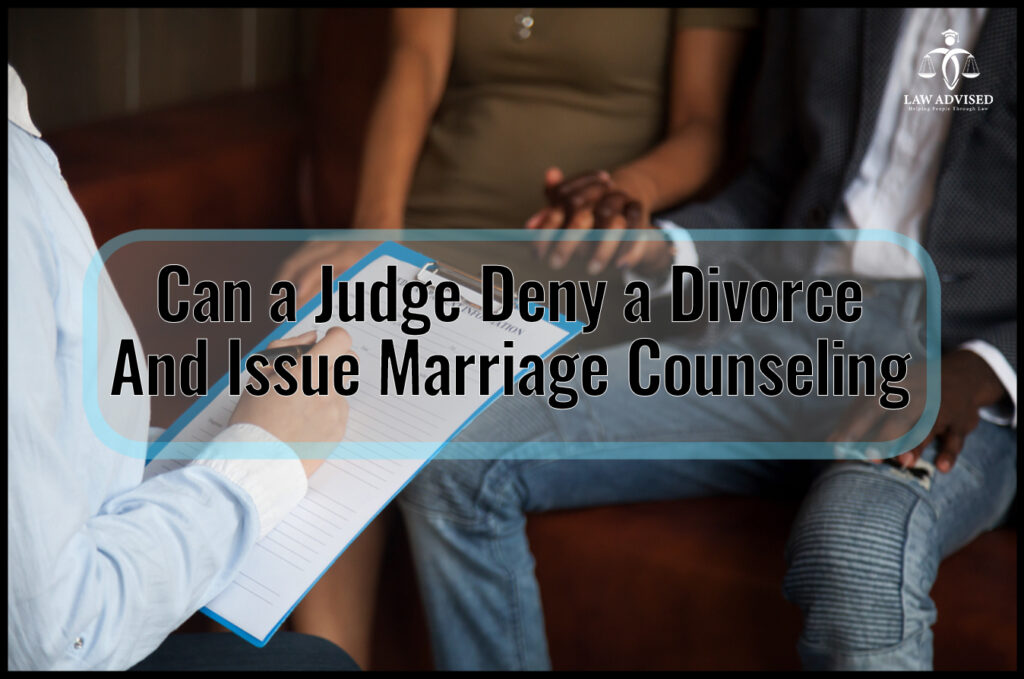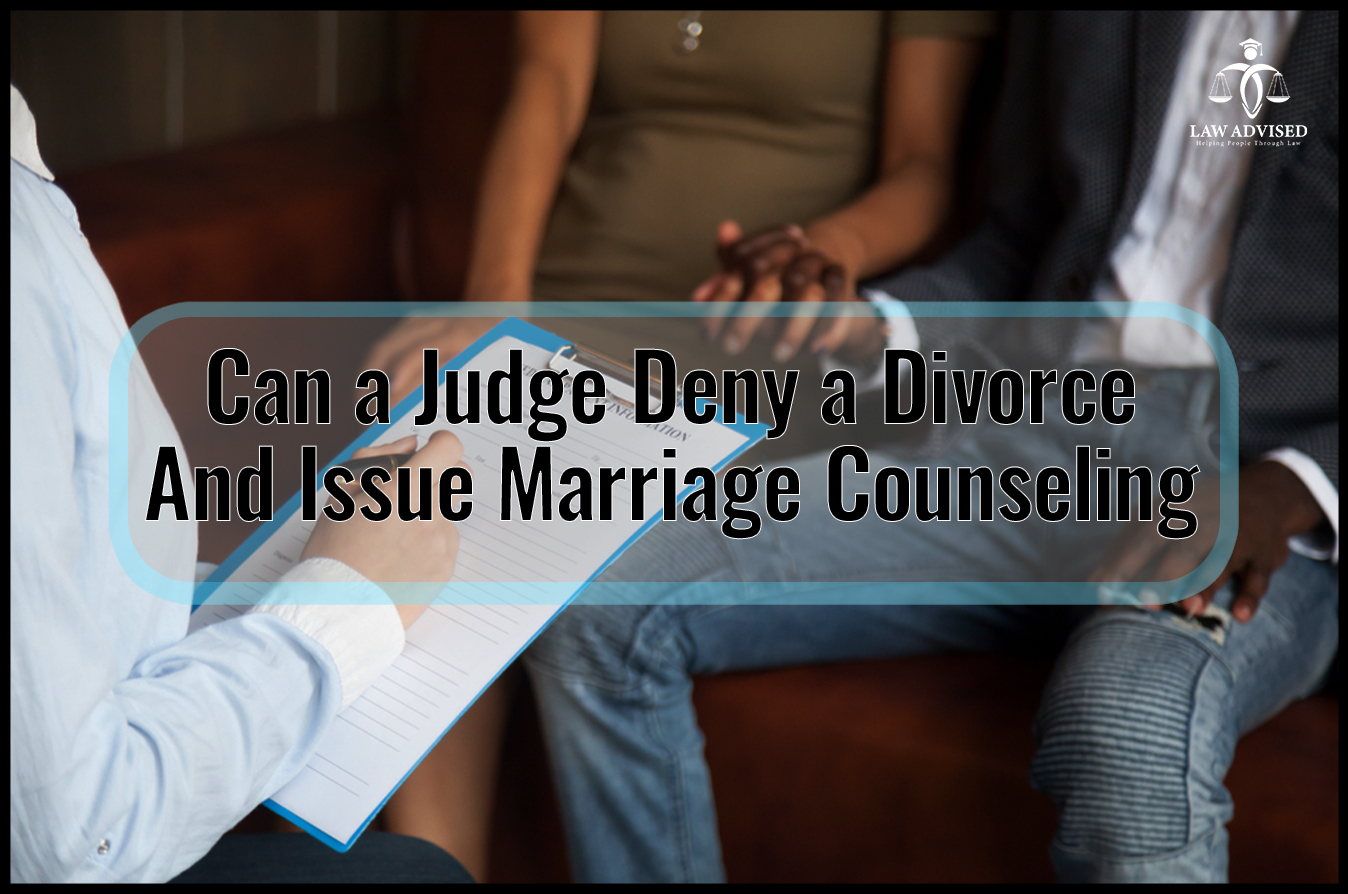A judge can deny a divorce and issue marriage counseling if they believe it can help reconcile the couple’s differences. In some cases, judges may feel that counseling is necessary before allowing the dissolution of a marriage.
However, the decision ultimately depends on the specific circumstances of the case and the judge’s discretion. Marriage counseling can provide an opportunity for couples to address and resolve their issues, potentially saving their marriage. It allows them to seek professional help and guidance in navigating their challenges and finding ways to rebuild their relationship.
We will explore the possibility of a judge denying a divorce and requiring marriage counseling, and discuss when and why this may occur.
Understanding The Authority And Discretion Of Judges
When a couple files for divorce, they look to the judge to make a final decision on the dissolution of their marriage. However, judges have the authority and discretion to deny a divorce and instead order marriage counseling. Judges are impartial decision-makers and are tasked with balancing the interests of the parties involved. They consider factors such as the best interests of any children involved and whether there is a chance for reconciliation. Denying a divorce and issuing marriage counseling may be done in situations where the judge believes that giving the couple an opportunity to work on their marriage could potentially lead to a resolution and prevent the harmful impact of divorce on both the spouses and the children.
In these cases, the judge’s decision is based on their evaluation of the circumstances and their determination of what is in the best interests of the parties involved. While it may seem unexpected or frustrating for a judge to deny a divorce and order marriage counseling, their actions are driven by the desire to foster healthier relationships and minimize the negative consequences of divorce.
Legal Standards For Granting Divorce
When a couple decides to dissolve their marriage, they must meet certain legal standards to obtain a divorce. These standards vary depending on the jurisdiction, but generally, they require the couple to prove that the marriage has irretrievably broken down. In many jurisdictions, this can be shown through the existence of specific grounds for divorce.
Grounds For Divorce
In some cases, a spouse seeking a divorce must provide evidence of fault on the part of the other spouse, such as adultery, cruelty, or abandonment. This is known as a “fault-based” divorce. However, in recent years, many jurisdictions have adopted a “no-fault” divorce system. This means that a divorce can be granted without the need to prove any wrongdoing by either party. Instead, the couple must demonstrate that their marriage is irretrievably broken and that there is no reasonable chance of reconciliation.
A no-fault divorce provides a less adversarial approach to ending a marriage and allows couples to focus on resolving their differences amicably. In addition, it facilitates the court’s role in prioritizing the best interests of any children involved. While some judges may recommend counseling in an effort to save the marriage, they generally cannot deny a divorce if the couple has met the legal criteria.
Challenging A Divorce Request
When a couple decides to seek a divorce, the process can sometimes be complicated. In certain cases, a judge may even choose to deny a divorce and instead recommend marriage counseling. This can occur when there are specific circumstances that warrant further evaluation. The judge will carefully consider the validity of the divorce petition, ensuring that all legal requirements are met. They will also assess the potential for reconciliation between the couple. These assessments are crucial in determining whether or not to proceed with the divorce or explore alternative options.
Exploring The Factors That Can Lead To A Denied Divorce
Divorce cases can be complex, and there are several factors that can contribute to a judge denying a divorce and suggesting marriage counseling instead. The first crucial factor is meeting the legal requirements. Each jurisdiction has different criteria that must be fulfilled for a divorce to be granted. Failure to meet these requirements can give the judge grounds to deny the divorce.
Disputed assets can also play a role in the judge’s decision. If there is significant conflict over property division or financial matters, the judge may view counseling as a way to address these issues and potentially salvage the marriage.
Similarly, child custody issues can have a significant impact on the judge’s decision. If there is a contentious dispute over custody or the well-being of the children, the judge may believe that counseling is the best way to ensure the children’s best interests are met.
In summary, meeting legal requirements and addressing disputes over assets and child custody are key factors that can lead a judge to deny a divorce and recommend marriage counseling instead.
Judicial Discretion In Denying A Divorce
If a couple seeks to end their marriage through divorce, it is generally assumed that courts will grant their request. However, in specific situations, a judge may exercise their judicial discretion and deny a divorce. One of the main considerations for a judge is the overall public interest involved.
The weighing of reasons against the public interest plays a pivotal role in the decision-making process. It is important for the judge to consider several factors, including the best interest of the children involved. The well-being and stability of the children are paramount concerns, and if granting a divorce may negatively impact them, a judge may choose to deny the request.
In these cases, the judge might order the couple to pursue marriage counseling instead. The aim is to provide an opportunity for the couple to resolve their differences and improve their relationship, ultimately serving the best interests of all parties involved.
The Scope Of A Judge’s Authority In Recommending Marriage Counseling
The scope of a judge’s authority in recommending marriage counseling is not well-defined and can vary from state to state. While some judges may have the power to deny a divorce and require the couple to undergo counseling, others may only have the authority to recommend counseling as an optional step before proceeding with the divorce process.
In many jurisdictions, judges are encouraged to promote the preservation of the marital bond and to consider the best interests of any children involved. This often includes making efforts to encourage mediation and alternative dispute resolution methods, such as counseling, in order to help couples reconcile their differences and potentially avoid divorce.
However, it’s important to note that a judge’s decision regarding marriage counseling is ultimately based on their interpretation of the laws and regulations in their jurisdiction, as well as the specific circumstances of the case. Therefore, the outcome can vary depending on the judge presiding over the divorce proceedings.

Potential Benefits And Drawbacks Of Marriage Counseling
Marriage counseling can have both potential benefits and drawbacks for couples seeking a divorce. One potential benefit is the opportunity to strengthen communication and conflict resolution skills. By working with a trained therapist, couples can learn to express their needs and concerns more effectively, leading to better understanding and compromise. This can be particularly valuable for couples who still have a level of emotional connection and are willing to work on their relationship.
Marriage counseling can also address power imbalances and abusive relationships. A skilled counselor can help identify dynamics of control and manipulation and provide support for the victimized spouse. By addressing these issues, counseling can help guide couples towards a healthier and more balanced relationship or provide the necessary tools for the victim to make an informed decision about divorce.
The Role Of Mental Health Professionals In The Process
Can a Judge Deny a Divorce and Issue Marriage Counseling? The role of mental health professionals in the process is crucial in determining the appropriateness of counseling. Mental health professionals play a significant role as they assess the emotional well-being and readiness of individuals seeking a divorce. Collaborating with judges and parties involved, professionals evaluate the potential benefits of counseling in reconciling the marriage.
Mental health professionals examine the couple’s history, communication patterns, and their willingness to participate in therapy sessions. They consider factors such as abuse, addiction, and mental illness that may affect the success of counseling. If it is determined that counseling may be helpful, judges can order mandatory counseling sessions before considering a divorce.
By involving mental health professionals, judges can make informed decisions based on the couple’s emotional state, the possibility of reconciliation, and the best interests of any children involved. This approach acknowledges the importance of addressing underlying issues before making the final decision about divorce.
Frequently Asked Questions On Can A Judge Deny A Divorce And Issue Marriage Counseling
Can A Judge Deny A Divorce?
Yes, a judge can deny a divorce if the requirements for divorce are not met, such as lack of legal grounds or jurisdiction.
Is Marriage Counseling Required Before A Divorce Is Granted?
In some cases, a judge may order marriage counseling before granting a divorce if it is believed to be in the best interest of the couple and their children.
How Can A Judge Deny A Divorce?
A judge can deny a divorce if there is insufficient evidence or if the couple has not met the legal requirements for divorce in their jurisdiction.
Can A Judge Order Couples To Attend Marriage Counseling?
Yes, a judge can order couples to attend marriage counseling if it is deemed beneficial for reconciliation or for the well-being of the couple and their children.
What Happens If One Spouse Refuses Marriage Counseling?
If one spouse refuses to attend marriage counseling ordered by a judge, it could potentially impact the outcome of the divorce proceedings and the judge’s final decision.
What Are The Reasons A Judge May Deny A Divorce?
A judge may deny a divorce if the couple has not lived separately for the required period, if there is insufficient evidence of irreconcilable differences, or if the grounds for divorce are not met.
Can A Judge Suggest Marriage Counseling Instead Of Divorce?
Yes, if a judge believes that there is a chance for reconciliation, they may suggest marriage counseling as an alternative to divorce.
Is Marriage Counseling Mandatory Before Filing For Divorce?
In most jurisdictions, marriage counseling is not mandatory before filing for divorce, but it may be required or recommended by a judge during the divorce proceedings.
Conclusion
A judge has the power to deny a divorce and instead order marriage counseling, providing an opportunity for couples to save their relationship. This alternative approach aims to address the root causes of marital issues and facilitate reconciliation. By prioritizing communication and understanding, counseling may offer couples a chance to rebuild a stronger foundation and create a healthier future together.
It’s important for individuals facing marital challenges to be aware of this potential option and consider the benefits it may provide.
Ismail Hossain is the founder of Law Advised. He is an Divorce, Separation, marriage lawyer. Follow him.





Leave a Reply